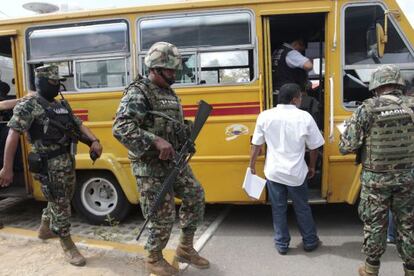100 days of bullets for Peña Nieto
The Mexican president’s changes to security policy fail to stem the violence: over 3,000 deaths in three months


Mexican President Enrique Peña Nieto has made radical changes to the strategy followed by his predecessor, Felipe Calderón, in the fight against organized crime. Yet his first 100 days in office still rang out with the sound of bullets. Since the candidate who symbolizes the return to power of the Institutional Revolutionary Party (PRI) took office, the national death toll from drug-related confrontations has been 3,157, or over 30 people a day. It is a very similar rate to that of the last six years, which resulted in 70,000 deaths. The bullets just keep raining down.
Achieving a peaceful Mexico was the goal that Peña Nieto set for himself last Sunday, during his own assessment of his first 100 days in office. But in view of the numbers, the president’s goal still appears to be a way off. His rhetoric is less belligerent than Calderón’s, who turned the war on drugs into his leitmotiv. One of the first things Peña Nieto did after taking office was to push forward reforms like the Victims Act or the creation of a special police unit. It remains to be seen whether these initiatives will have the desired results.
The countdown has begun. Last week, the government presented the homicide figure for the month of February: 914 victims, something it touted as a success. Certainly, it was the lowest number in over three years, representing a 40-percent decline from the same month last year. But the reality is that these statistics do not reflect victims like the 10 peasants who were shot down a few days ago in a melon field in the municipality of San Pablo Oriente, in Guerrero. Guerrero and two other states in the Mexican republic, Zacatecas and Veracruz – which happen to be particularly troubled spots where shootouts take place every other day - have not released their fatality figures so far this year.
In any case, analysts are accepting the drop in crime figures as real, but not without criticism. Alejandro Hope, a security expert and contributor to the Mexican Competitiveness Institute (IMCO), believes that violence has been declining for the last 18 months. “And it has nothing to do with what Peña is either doing or not doing. It has been dropping for quite a while,” says Hope. The reasons why? “There is greater state capacity, and the state is going more after midlevel people rather than bosses [of crime gangs], which used to create chaos and more internal warfare. There were also a few collaborative agreements in the criminal underworld and the sale of cocaine went down.”
It has nothing to do with what Peña is doing or not doing. It has to drop"
But some people question the methods used in the victim count. Sandra Ley, a scholar at Duke University who has researched the impact of violence on Mexican politics, keeps her own count, regularly pores over statistics, and concludes that everything continues to be pretty much the same.
“There is no noticeable change,” she holds. The official statistics, says Ley, are not as reliable as they should be, since national figures depend on information provided by the 32 local attorney’s offices, and this information is not checked for accuracy.
This lack of rigorous information on the subject of violence has created monsters. The country has reached a point where the mere fact of dying automatically turns the victim into a suspect. There is widespread belief that criminals kill each other, and that if someone wakes up with a bullet in his brain, he pretty much deserved it, most likely. “Why did he get involved? If he got killed, he must have done something,” is a common sentiment. “The victim is criminalized,” adds Hope.
As for the authorities’ claim that 93 percent of deaths are somehow related to organized crime. Hope is skeptical. “So the authorities had previously reviewed the criminal records of the 914 individuals who were assassinated in February? I have to laugh at that. ‘This one was said to be involved in petty drug dealing, that one was reported to be in bad company...’ That’s how scientific the procedure is when they draw up the statistics.”
Peña Nieto has vowed to search for the thousands of desaparecidos
Violence, which is particularly affecting Acapulco and Comarca Lagunera, in the north of the country, has lately made headway in areas that had seemed off limits until now. In October of last year, Mexicans learned of the assassination in Coahuila of Eduardo Moreira Rodríguez, the 25-year-old son of Humberto Moreira, who was the state governor between 2005 and 2010. “My son has become one of the fatalities of this war, one of the thousands of dead in this very sad war. I am now experiencing it personally,” he said in a bleak statement that captured the spirit of an era. Only last Saturday, the tourism secretary for Jalisco was gunned down. Increasingly, there are fewer untouchables in this country.
For the PRI politician Omar Fayad, chairman of the Senate’s public security committee, the first 100 days of Peña Nieto’s government have already yielded some relevant results, especially with regard to reforms. The government enacted a Victims Act that the previous party in power, the PAN, either could not or would not; it also regionalized the fight against crime with the aim of reducing the three types of crime that are hitting Mexicans the hardest: murder, kidnappings and extortion. The Peña Nieto administration has also appointed a visible head of the Public Security Department, Manuel Mondragón; this is something that Calderón never did, and which Fayad considers one of his most serious mistakes. And there is more: “The president does not blame anybody for his current suffering, the way his predecessor did. He does not blame the municipalities. He simply acts. He is a man of action,” he says.
Another work in progress for the government is ending impunity. “If you killed someone in the last six years, the probability of your being in prison on a homicide conviction is less than one percent,” wrote the columnist Carlos Puig in the newspaper Milenio. The writer was quoting a document released by the Office of the Mexican Attorney-General, which showed that of the 92,048 murders recorded between 2006 and 2012, only 679 people had been found guilty of homicide. That is 0.73 percent.
On the other hand, it is a priority to end the abuse and the troublemaking by some police officers and military personnel. In the last two years, authorities abused a legal resource known as “arraigo,” detention without charges while the investigation is underway. Of the last 4,000 arrests, only three percent of detainees faced a court. The rest were released due to lack of evidence, though not without first spending a good deal of time in the rather uncomfortable “arraigo centers,” a prison that does not even have a name. The logic goes like this: arrest first, investigate later.
In his desire to break with the previous six years, Peña Nieto has vowed to search for the thousands of desaparecidos, people who went missing and were never heard from again. This was a taboo topic for the previous administration. During these first 100 days of government, the deputy secretary for legal and human rights affairs in La Sedena, Lía Limón, unveiled a database with the names of 27,523 people who went missing in the last six years, a murky affair that even institutions find themselves involved in. A Human Rights Watch report claims that law enforcement officials had a role in at least 149 cases of missing persons. Meanwhile, a little over 100 kidnappings were reported in the last three months, an identical figure to the one under Calderón. It is a tiny number if one is to believe reports by several organizations which talk about 72 kidnappings a day, most of which go unreported.
The murder of journalists was also a staple of the previous administration. Under Calderón, 44 reporters were killed and eight simply vanished off the face of the earth. Officially, there has been just one fatality, the editor of a news website from northern Mexico who was shot down, but there might have been many more: El Siglo de Torreón was attacked by armed commandos up to three times. The newspaper El Zócalo de Saltillo announced that it would stop reporting on crime in order to protect its workers’ lives. The Inter-American Press Association concluded this week that neither impunity nor journalist vulnerability has declined in the country, and said it will meet with the president to address this issue.
The ball is now in Peña Nieto’s court. The president faces an extraordinary challenge: ending the climate of war that predominates in some parts of the country. His success, or lack of it, will decide on which side of history’s dividing line he is to be placed.
Tu suscripción se está usando en otro dispositivo
¿Quieres añadir otro usuario a tu suscripción?
Si continúas leyendo en este dispositivo, no se podrá leer en el otro.
FlechaTu suscripción se está usando en otro dispositivo y solo puedes acceder a EL PAÍS desde un dispositivo a la vez.
Si quieres compartir tu cuenta, cambia tu suscripción a la modalidad Premium, así podrás añadir otro usuario. Cada uno accederá con su propia cuenta de email, lo que os permitirá personalizar vuestra experiencia en EL PAÍS.
¿Tienes una suscripción de empresa? Accede aquí para contratar más cuentas.
En el caso de no saber quién está usando tu cuenta, te recomendamos cambiar tu contraseña aquí.
Si decides continuar compartiendo tu cuenta, este mensaje se mostrará en tu dispositivo y en el de la otra persona que está usando tu cuenta de forma indefinida, afectando a tu experiencia de lectura. Puedes consultar aquí los términos y condiciones de la suscripción digital.








































